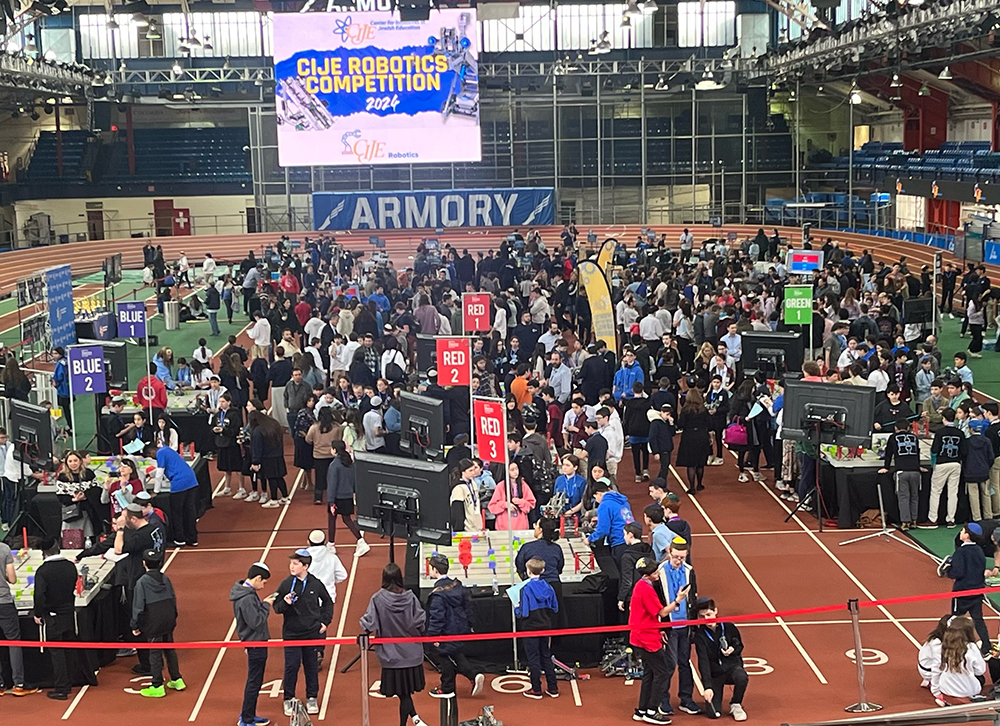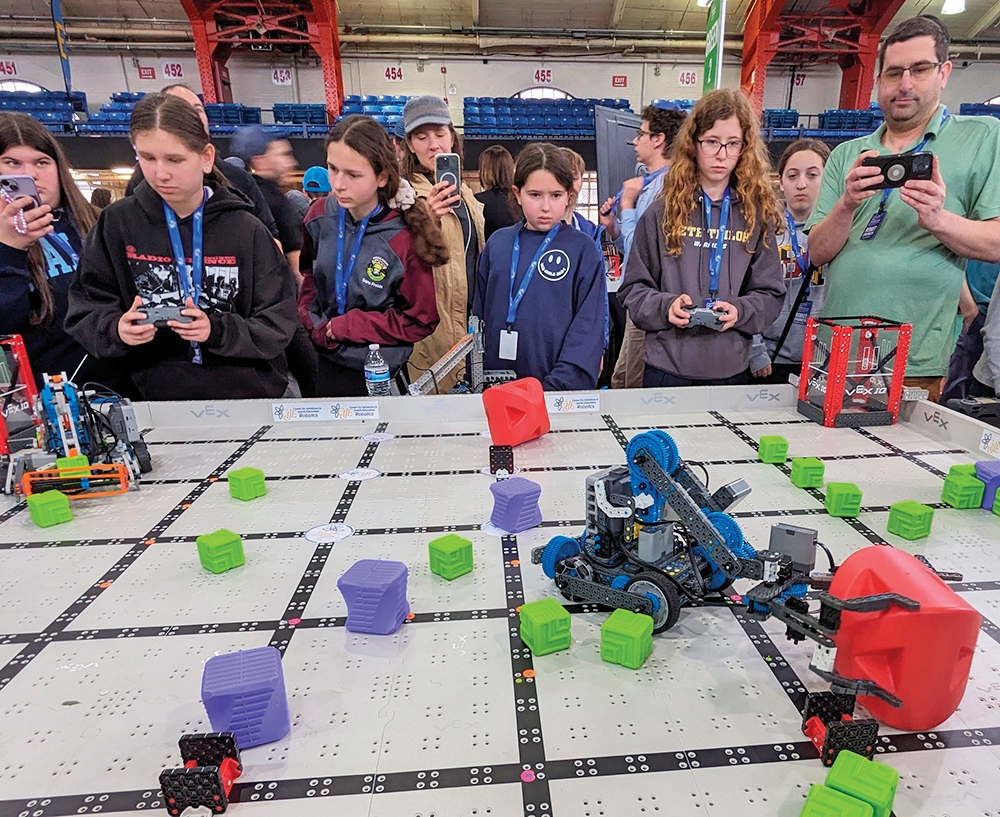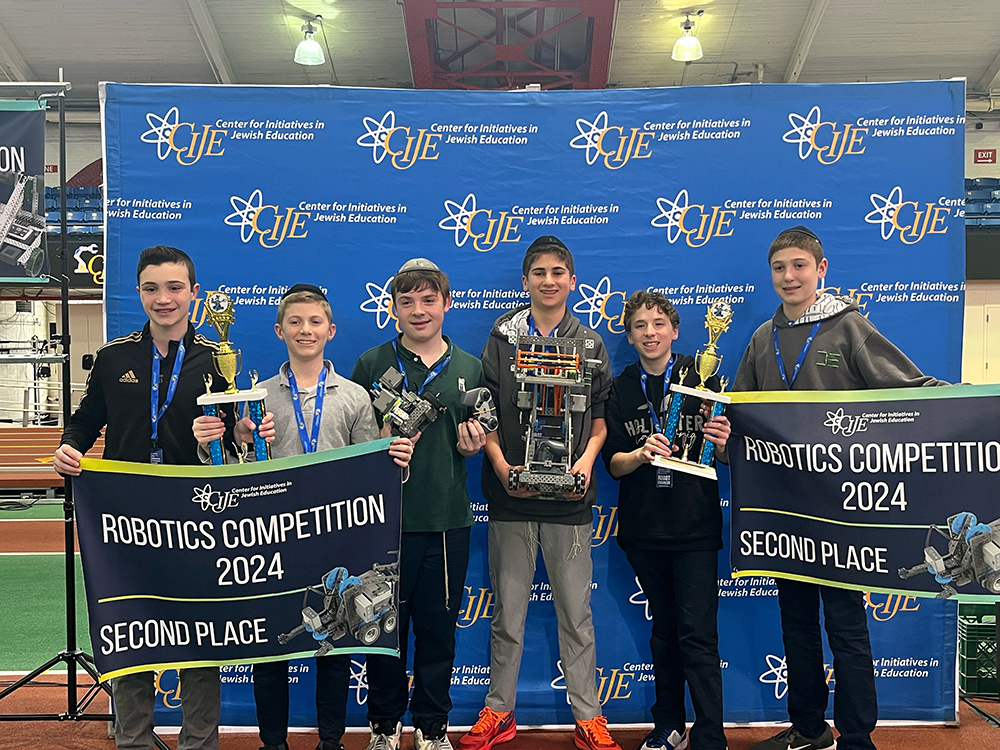Edison’s RPRY teams dominate the competition.

Hundreds of students, representing 118 teams from 24 middle schools around the country, competed at the CIJE Vex Robotics Tournament on Monday, April 1, at the Fort Washington Armory in Washington Heights. The competition was dominated by the robotics team from Rabbi Pesach Raymon Yeshiva (Edison) as two pairs of their teams combined to take the top two finishes.
Due to most Vex tournaments being held over weekends (and therefore on Shabbat), competing is an issue for the Jewish community. That’s where the Center for Initiatives in Jewish Education (CIJE) steps in to make amazing events like this one possible.

Created in 2001, CIJE coordinates educational programs in more than 175 Jewish schools across the country. These programs impact the learning of more than 45,000 students each year. According to the organization, the goal is to prepare the next generation for innovation by funding programs with advanced technology, developing engaging curricula, and providing ongoing teacher training, mentorship and school visits by engineers.
In this case, CIJE invited middle school teams from all types of Jewish schools all over the country to compete in this year’s championship. Many schools in the tri-state area were represented along with schools from communities including Baltimore, Dallas, Cleveland and Miami. But CIJE does more than host the tournament. They supply the schools with the materials to build the games as per the specifications that Vex sends out. This allows the schools to have a playing field for the students to practice on that they have access to throughout the year.

The CIJE Robotics League challenges students to work in teams throughout the school year to build robots that compete in multi-school tournaments, culminating at this event. Students learn advanced programming, mechanical building, teamwork and problem-solving through the process of building their robots and competing.
The Middle School division has a cooperative format where two teams compete with each other and both receive whatever score they are able to accomplish together. In this case, teamwork was really on display. Not only did the teams have to cooperate to build a robot before the event, they had to learn to work alongside a random team in each round to score as many points as possible.
This year’s competition featured three main objectives. The simplest (and often the first accomplished) was to knock three large balls off of their pedestals. Next easiest (and performed last), was making sure that robots were “parked” in a scoring zone at the end of the round. The main part of the round and the most significant variable in a team’s score was based on their ability to transfer cubes from the playing field to three collection towers that were positioned in the corners of the arena.

But the goal was harder than just trying to collect as many cubes as possible. Teams had to gather matching cubes to receive greater values and there were also bonuses for making sure that all of the towers were filled instead of just one or two. This meant that the teams had to cooperate regarding which robot would fill which towers and with which color cubes.
RPRY brought a dozen teams to the competition. One of the reasons for the high attendance likely worked to heir advantage. Every eighth grader at RPRY participated since, unlike the majority of middle schoolers, RPRY offers robotics class for every student (instead of just an after-school club). Using the Teach NJ STEM Initiative, the last period of the day from Monday to Thursday is a STEM class. The topic changes from day to day, but robotics is in the curriculum.
“I really believe in finding the spark of joy in every child,” said Chana Luchins, RPRY’s principal of learning for General Studies in grades four to eight. “You have to offer the opportunities to every kid because they may not know what it is that they might be great at.”
Clearly, the students were good at robotics. Their robots not only did very well in the qualifying rounds, but they secured the spots at the top of the leaderboard. That was particularly key in this case because it meant that they would be paired for the playoffs. Once that happened, the result seemed inevitable as the teams from RPRY were well-practiced at playing alongside each other, whereas the other competitors were paired with teams from other schools.

“At RPRY, we prioritize robotics and STEM learning because it empowers our students to embrace problem-solving and failure as essential steps towards success,” said Head of School Rabbi Michael Ribalt. “Cultivating this resilience from a young age instills in our talmidim and talmidot the confidence to tackle challenges head-on and innovate for a better future.’
It was clear by looking around the competition that the kids were taking the event seriously. And while there was certainly a lot of fun going on, it was still healthy academic competition as well. This might not be literally sports, but it would be hard to tell. Teams had everything from matching jerseys and sweatshirts to huddles and team chants.
“As we enter our fifth year of guiding robotics competitions, we stand at a transformative juncture within the realm of Jewish education,” said Orly Nadler, CIJE’s director of Innovation. “It feels as though we’ve arrived at a critical moment of convergence, a tipping point, with schools eagerly joining our network, captivated by the vibrant spirit of these collaborative contests. We hear from parents who describe robotics as a vital anchor for their children, providing a channel for their energies and a path to meaningful achievement.”
With STEM options increasing in schools everywhere, CIJE’s role to help facilitate corresponding growth in Jewish day schools is greater than ever. Their goal is to be there for whatever is next for the future in STEM education, and events like these demonstrate how happy the students are that CIJE is there to help them expand their educational horizons.
| Middle School | |
| 1st | Rabbi Pesach Raymon Yeshiva (NJ) |
| Rabbi Pesach Raymon Yeshiva (NJ) | |
| 2nd | Rabbi Pesach Raymon Yeshiva (NJ) |
| Rabbi Pesach Raymon Yeshiva (NJ) | |
| 3rd | Levine Academy (TX) |
| Hillel Yeshiva (NJ) | |












